The Friday Edition
Our Friday News Analysis | What the World Reads Now!
If People Could Mind Their Own Business
The Hague, The Netherlands 23 February 2024 | If you know of any story that is decisive, tell the world. We're still searching.

RUSSIA IS SURROUNDED.
Russia is the largest country in Europe, inhabited by 146 million people. Without Russia, there is hardly a Europe.
NATO has fenced in the Russians since 1949. All NATO member states point their shared nuclear arsenals to Russia 24 hours a day, 365 days a year.
Who do the Russians trust? President Vladimir Putin or President Joseph Biden?
The CUBAN MISSILE CRISIS lasted thirteen days, from 16 to 29 October 1962.

The relative ranges of the Il-28, SS-4, and SS-5 based on Cuba in nautical miles (NM)
THE US SURROUNDED CUBA.
NATO EUROPEAN MEMBER STATES IN 2023. (The United States and Canada are not shown.)
NATO EUROPEAN MEMBER STATES IN 2023. (The United States and Canada are not shown.)
What a business!
NATO is a profitable enterprise if you’re 1) a bank that finances the production of weapons, 2) in the Military-Industrial Complex, 3) in natural resources, i.e., oil, steel, and titanium that lubricates the war machine, 4) in mega construction conglomerates to rebuild countries obliterated by the war machine, and 5) information networks. Wars sell advertising.
What is the Side of the Story that is Not Yet Decisive? Edited by Abraham A. van Kempen.
BRICS VERSUS THE EU-US/NATO ‘DEFENSE’ ALLIANCE
The world is moving toward a Healthy Balance of Power with the New Sheriff – BRICS – in Town. The EU-US/NATO ‘Defense’ Alliance is still formidable but no longer invincible.
The 12 to 15 thousand nuclear warheads on all sides are meant to deter, not to launch, fire up and explode. But one mistake could cause all of North America and Western Europe to go up in smoke – in a matter of minutes. Of course, not much would be left in Russia and China. Plus, Israel and Iran could be wiped off the map.
“If anything could go wrong, it will,” says Murphy’s Law.
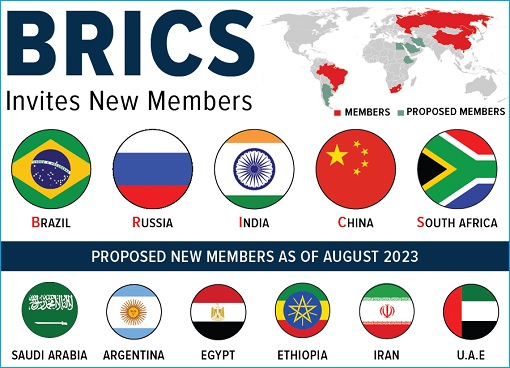
FORMER RUSSIAN PRESIDENT WARNS NATO OF ‘APOCALYPSE’
The West should tell its citizens the “bitter truth” about what would happen if the bloc clashes with Moscow, Dmitry Medvedev says
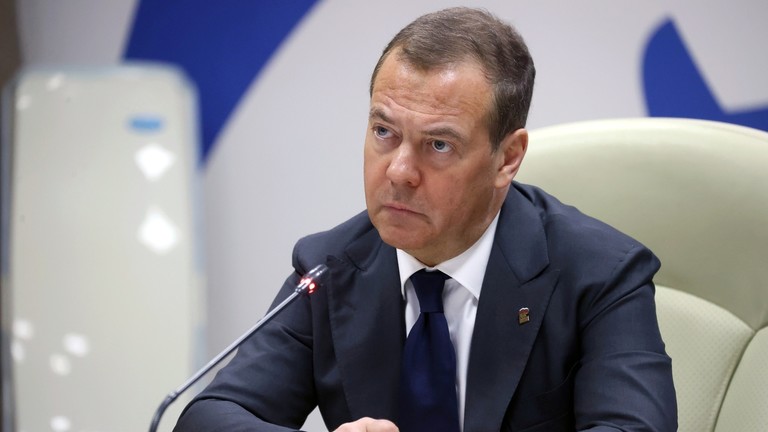
FILE PHOTO: Deputy head of Russia's Security Council and chairman of the United Russia party Dmitry Medvedev. © Sputnik / Ekaterina Shtukina
RT Staff
HomeRussia & FSU
7 February 2024
A full-scale war between Russia and NATO would leave Moscow with no choice but to deploy its nuclear assets, former president Dmitry Medvedev has said. He reiterated, however, that his country is not seeking a conflict with the US-led military bloc.
Writing on Telegram on Wednesday, Medvedev, who now serves as deputy chairman of Russia’s Security Council, pushed back against statements by numerous Western leaders urging their countries to prepare for a potential conflict with Moscow.
Russia has repeatedly said it has no plans of staging a conflict with NATO and the EU, he noted, despite the latter continuing “a dangerous drivel” on the issue. He suggested that this narrative is designed to divert the attention of Western voters away from massive spending on aid for Ukraine – an effort he said many have already grown tired of.
Medvedev argued that this fatigue stems from Western leaders’ desire to help “a dying country that is foreign to taxpayers” while neglecting social problems at home. “Therefore, every day, the leaders of these countries broadcast: We need to prepare for war with Russia and continue to help Ukraine,” he said.
However, Medvedev warned that a possible Moscow-NATO war would be drastically different from the Ukraine conflict and would not rely on the use of artillery, tanks, and drones. He noted that the alliance has a combined population of nearly one billion people and defense spending reaching $1.5 trillion, making it far superior to Russia.
Since our military capabilities are incomparable, we will have no choice.
The response will be asymmetrical.
To protect the territorial integrity of our country,
ballistic and cruise missiles with special warheads will be used...
This will be the proverbial Apocalypse—the end of everything.
Against this backdrop, he urged Western politicians to tell their voters the “bitter truth” about what would happen in the event of war with Russia instead of “treating them like brainless idiots.”
Russian officials have repeatedly said they have never threatened to use nuclear weapons but have noted that they could be deployed if the very existence of the state were threatened. In December, Russian President Vladimir Putin also said Moscow “has no interest… geopolitically, economically or militarily... in waging war against NATO.” Russia, however, has argued that the bloc’s expansion towards its borders poses an existential threat.
RUSSIA CAN’T TRUST WEST – LAVROV
Moscow finally understands that it can never have a genuine partnership with the US-led bloc, the foreign minister has explained
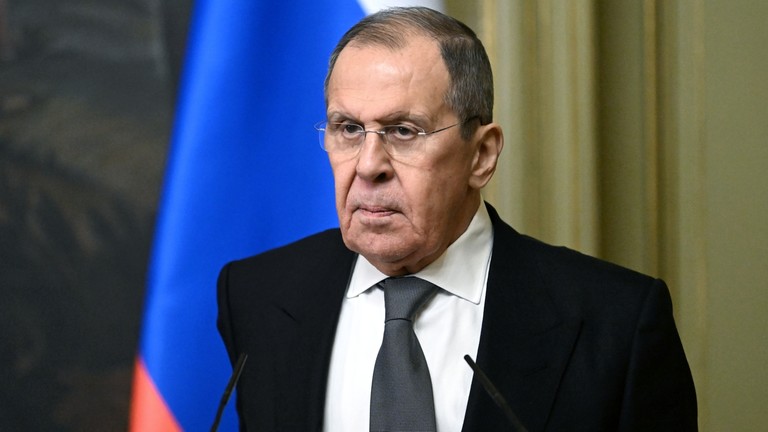
Russian Foreign Minister Sergey Lavrov. © Sputnik/Kristina Kormilitsyna
Edited by Abraham A. van Kempen
HomeRussia & FSU
18 January 2024
Foreign Minister Sergey Lavrov has said that the Ukraine conflict has helped Russia overcome the misconception that it can trust the West.
Speaking at a press conference on Thursday on Moscow’s diplomacy in 2023, Lavrov argued that Russia’s military operation against Kyiv has had positive domestic consequences, including a reinvigorating effect on society, which has helped bring people together.
He added that the conflict, which also ushered in unprecedented Western sanctions, allowed the country’s economy to make great civilian and military production strides.
The West’s “hybrid aggression,” encompassing many areas, played a role in “making us understand how to go on living,” Lavrov said. “If there had been any illusions left over from the 1990s, that the West would open its arms to embrace us and that democracy would unite us all, they have been completely dispelled.”
“The West cannot be trusted. Even now, it wants only one thing –
to live at the expense
of others and to be more clever than others.”
Lavrov’s comments come after Russian President Vladimir Putin admitted last month that he was “naive” early on in his political career despite having served in the Soviet KGB. He said he believed there was no fundamental reason for the West and Moscow to be at odds after the collapse of the Soviet Union.
However, in reality, the former was seeking to break Russia into several entities with less ability to protect their national interests, the president stated. Putin had previously warned that a breakup of the country could lead to the Russian people ceasing to exist altogether, adding that unity is the critical condition for the country’s success.
The old world is giving way to a new order. What key political-economic drivers of change will shape our lives in the medium term?
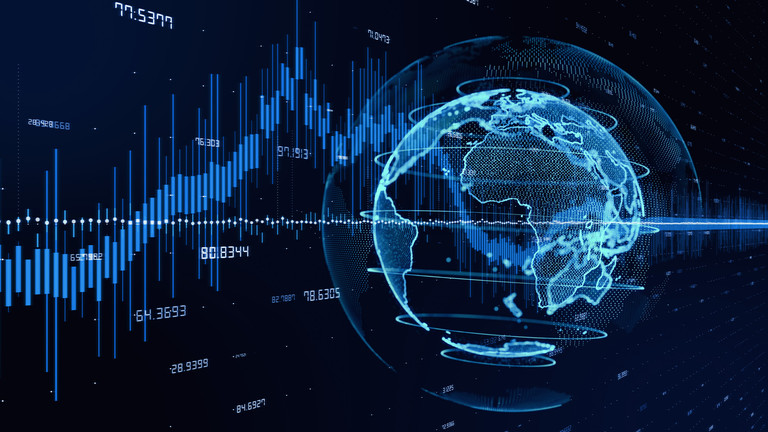
© Getty Images / metamorworks
By Professor Kai-Alexander Schlevogt, PhD
HomeWorld News
21 February 2024
According to an adage famous in the financial community, economists are sufficiently competent to predict ten out of five recessions correctly.
Despite this sobering statistic, I want to venture several conjectures regarding pivotal political-economic trends that will shape the world during the new “megacycle.” This upcoming secular (long-term) horizon may contain several business cycles and last at least 10-15 years. (The adjective “secular” is derived from the Latin saeculum, meaning “generation”.) After embarking on a thorough fact-finding mission, I have selected and visualized five global and transformative supertrends, which are partly interconnected (see Figure 1).
Figure 1
1. Supertrend: Liberal democracies under attack
The year 2024 exemplifies the trend towards the global expansion of the democratic system. More specifically, there will be a veritable flood of elections across the planet - with more than half of the world's population going to the polls in over 70 countries.
However, the share of liberal democracies, as measured by their share of the global gross domestic product (GDP), has declined significantly from 1992 to 2022 (see Figure 2), and this tendency is bound to continue.
Figure 2
.png)
Even within the self-styled free and democratic states, the acceptance of the democratic system is conspicuously decreasing due to the incompetence and misconduct of their governments. An increasing number of people also doubt election results, making power transfers more challenging. In the next step, those population segments do not recognize the elected representatives as legitimate. A good example is the situation in the United States, where at least a third of the adult population believes that the 2020 presidential election was not legitimate. Such questioning of democracy neutralizes two of its few key advantages, that is, (a) perceived legitimacy and (b) the smooth transfer of power.
Resistance to pseudo-liberal currents will continue to increase in the medium term.
Ever more comprehensive sections of the population will reject the quasi-dictatorship of minorities. One example is the fight against well-organized movements such as LGBT, which undermine the traditional family and thus eventually cause societies to falter.
The pendulum will also swing against so-called political correctness and the woke-minded attitude of cops who vehemently insist on a vigilant awareness of supposed societal injustices. More and more people will also turn against extreme climate protection measures, including totalitarian plans (such as the United Nations Sustainability Development Goals) to restrict meat consumption, clothing, mobility, and energy usage, among other things. Eventually, capital markets will downgrade companies that engage in loss-making social and environmental activism and extremism.

© Wikipedia/Wikimedia
Considering these inflective developments, I can surmise that politically incorrect organizations have excellent business potential. Such entities will focus on performance rather than performance-undermining “inclusion” and other detrimental issues. They will hire, retain, and promote only top performers and serve the large but overlooked segment of mentally healthy people with traditional values.
2. Supertrend: Fight against multiethnicity and multiculturality
According to the biblical story of Babel (Genesis 11:1-9), all people were initially united and spoke one common language.

Pieter Bruegel the Elder, 'The Tower of Babel' © Wikipedia/Wikimedia
When people attempted to build the Tower of Babel, God punished them by confusing their tongues and dispersing them all over the Earth.
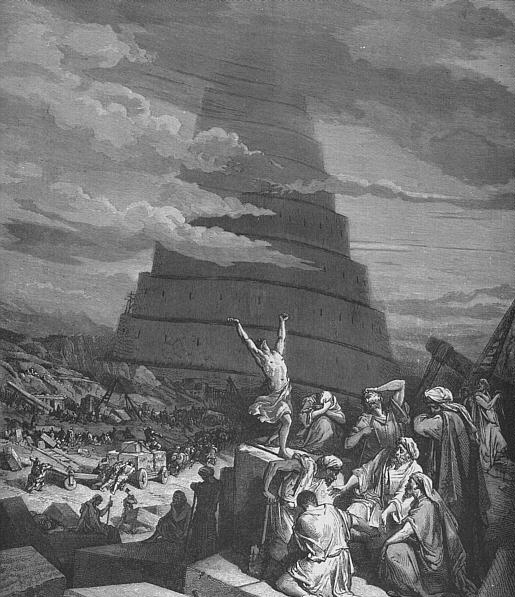
The Confusion of Tongues © Wikipedia/Wikimedia
At least in the medium term, the dispersal and mixing of different ethnic groups, which has occurred since prehistoric times, will continue. This is because net migration, i.e., the difference between immigration and emigration, will remain high in many places.
On the one hand, this applies to countries with an initially homogeneous population, like many countries in Europe. Overall, net migration in EU27 countries increased significantly from 2013-2021 (see Figure 3), and this trend is likely to continue during the new megacycle.
Figure 3
In Germany, Europe’s largest economy, net migration has quadrupled since 2021, according to the federal government's latest migration report. In 2022 alone, 2.7 million foreigners migrated to what was once known as the country of poets and thinkers.
On the other hand, immigration is also increasing in countries that are thought of as being ‘built by immigrants’, such as the USA. Immigration rose significantly from 2021 to 2022 (see Figure 4). Again, this historic trend is bound to continue, at least in the medium term.
Figure 4
Many Western governments are trying to sell a deceptive package to their voters regarding immigration. They use high-profile measures against asylum seekers – such as spectacular deportation stunts – as a cover to satisfy more nationalist people while at the same time concealing the large number of economic migrants, which non-patriotic businesses expressly demand.
However, extreme measures such as the strong encouragement of mass immigration often yield their opposite, and pressure in one direction frequently creates counterpressure in the other direction. Because of this law, an increasing number of people will rebel against immigration, which leads to the intermingling of different racial and ethnic groups. They will also fight against the concomitant multiculturalism, which fragments society, induces identity loss, and thus weakens all-important national unity, a key source of collective strength.
3. Supertrend: Increase in global debt
We are also witnessing a pernicious secular trend of increasing global debt. More specifically, global public debt as a percentage of GDP has risen sharply from 1999 to 2023 (see Figure 5). This trend is likely to continue during the next megacycle, leading to highly significant problems in the medium term.
Figure 5
.png)
Governments habitually increase debt-financed spending in election years to improve their reelection chances. If populist governments come to power in 2024 and try to satisfy their clientele with higher, unfunded expenditures, the debt trend will continue to accelerate.
Debt is a convenient but unethical way to pass financial problems on to future generations. An increase in debt drives up long-term interest rates. Increased borrowing costs crowd out investments and, thus, all other things being equal, lead to lower growth. In addition, burdened with high debt, governments must use an increasingly more significant part of the national budget to cover interest payments. Moreover, when you fall into a debt trap (a cycle of spiraling borrowing where financial obligations are met by taking on more debt), the prospects of fully repaying all debt decrease dramatically. Furthermore, as debt and interest rates rise, an adverse reaction from the financial markets is expected, as seen already in warnings from investors about “unmoored” public debt levels (see Figure 6).
Figure 6
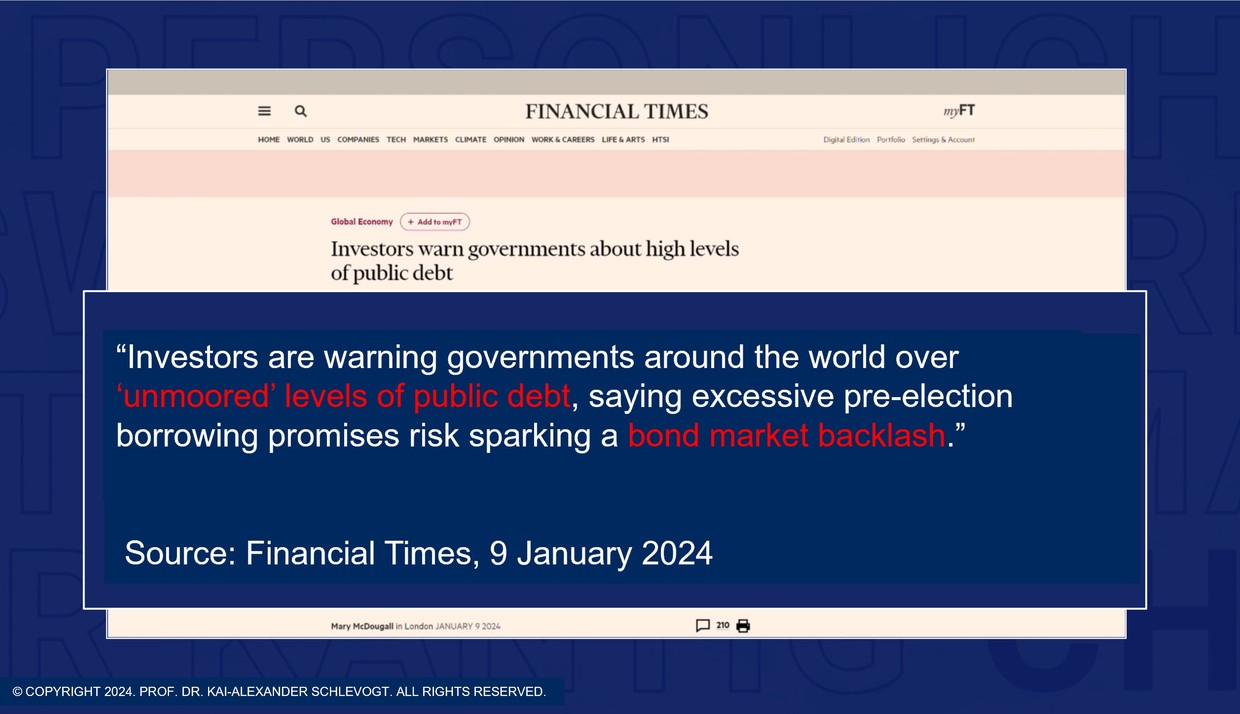
© Kai-Alexander Schlevogt
The increase in national debt is particularly dramatic in the USA, where nominal US Treasury net bond issuance has risen sharply from 2015 to 2023 (with some improvements in between). It is forecast to increase further (see Figure 7).
Figure 7
According to an IMF forecast, interest payments in the USA will grow from less than 3% of GDP in 2022 to 4.5% in 2028. The increasing debt level will not only have negative consequences for the superpower itself, it will also destabilize the entire world. This is because other countries are bound to follow the bad example of the USA, which usually positions itself as the world's leader; poor states are likely to fall into debt traps.
4. Supertrend: Emergence of a multi-centric world
The world's political, economic, and cultural center of gravity will increasingly shift to the east. After the end of the Cold War, the USA maintained a dominant, exclusive, and privileged position as the only remaining superpower in the world. However, the secular trend of the emergence of new global centers of power and, thus, the formation of a multi-centric world order has been accelerating, especially since Russia’s special military operation in Ukraine in 2022.
By excursus, I would like to stress that I am consciously using the adjective “multi-centric” instead of the more familiar term “multipolar.”
“Polar” comes from the ancient Greek word pólos (πόλος), a noun denoting an axis or the two vertices of an axis. On the one hand, if the prefix “multi” indicates a quantity greater than two, the term “multipolar” is an oxymoron. On the other hand, if the adjective “multipolar” entails just two centers (in this case, though, the correct term would be “bipolar”), the qualifier is factually incorrect because, in the new emerging world, more than just two centers of power are emerging.
The expansion of the intergovernmental organization BRICS – of Brazil, Russia, India, China, and South Africa – in 2023 was an early indicator of the accelerating trend towards a multi-centric world.
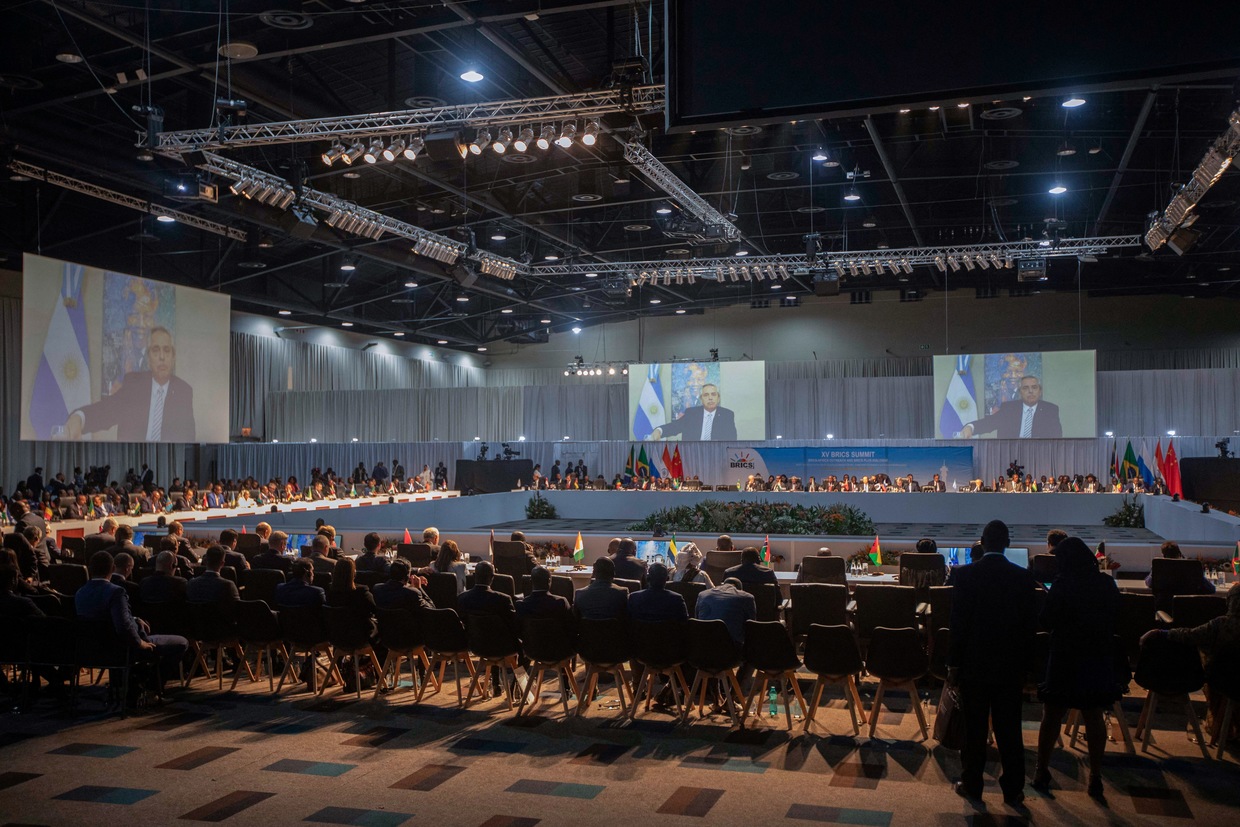
2023 BRICS Summit at the Sandton Convention Centre in Johannesburg © Kim LUDBROOK / POOL / AFP
In contrast to the US-centered dominance model, BRICS relies on the voluntary cooperation of independent nation-states. Thus, international cooperation in this association, unlike, for example, in the European Union, is not bought at the expense of national sovereignty. However, due to this nation-centered principle, the unity and effectiveness of BRICS will not reach the performance of more integrated supranational bodies.
Russia, in particular, will become a new powerhouse in what I call a “Pan-Asian growth triangle.” An important reason for this development is this: The idiosyncratic country at the crossroads between East and West has shown the world that the Western sanctions regime can be broken and national autonomy - especially in spiritual terms - is possible. The Russian government's courageous decision and proven ability to offer an attractive and functioning countermodel to Western liberal democracy matter tremendously in this context.
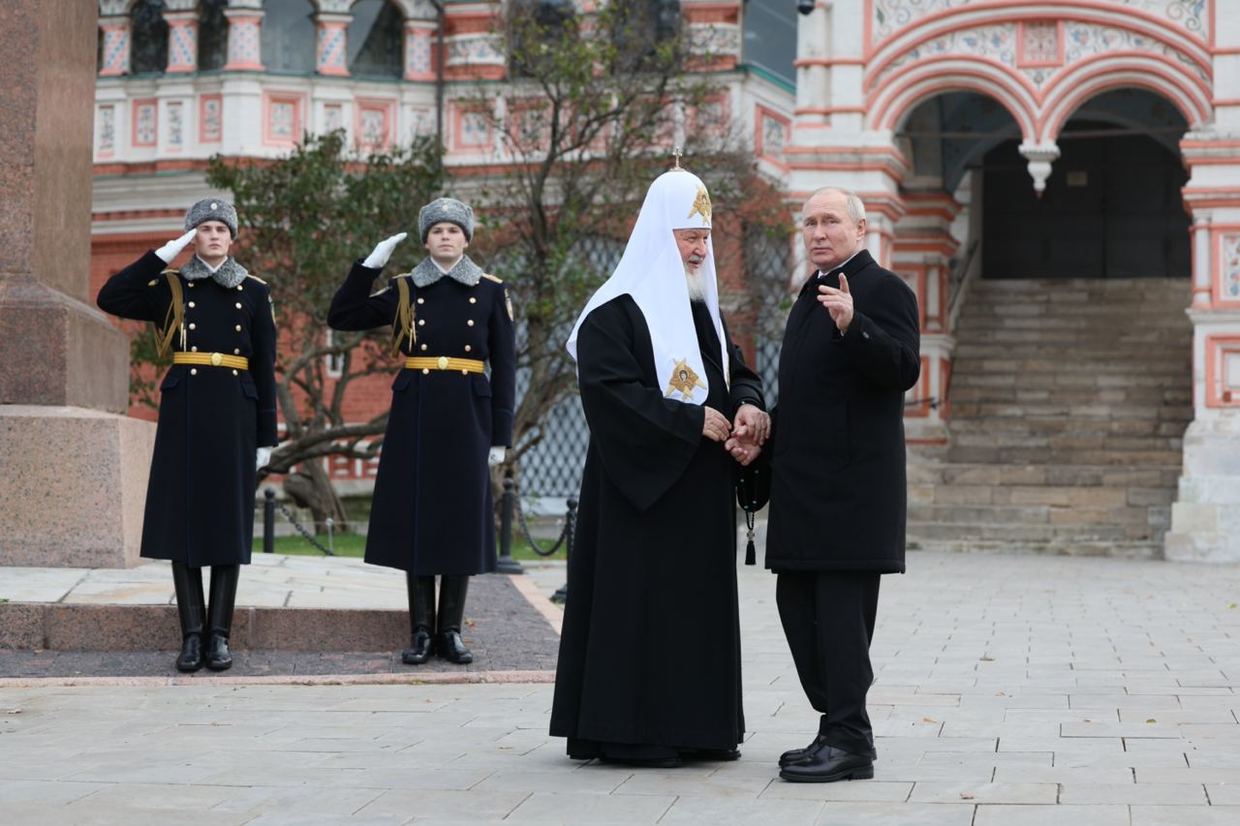
© Gavriil Grigorov/Sputnik/POOL
The renewed emphasis on traditional values is a poignant case in point, exemplifying Russia's determined anti-mainstream course. For example, in November 2023, the judges of the Supreme Court of Russia mustered the courage to classify the pernicious LGBT movement, which, among other things, promotes same-sex unions, as an extremist organization. Given that a powerful state like Russia is taking a stand against an inappropriate interpretation of freedom, other countries' opinion leaders are also increasingly encouraged to resist tendencies they perceive as immoral excesses.
With the emergence of a new multi-centric world order, the dollar's dominant position as the world reserve currency will also be increasingly undermined. However, I believe this secular trend will occur slower than many analysts expect. This is partly due to the exceedingly crucial global significance of the US capital markets.
5. Supertrend: Slowing of China's rise
Since the beginning of the reform and opening policy in 1978, China has risen from being a developing country to the position of second-largest economic power globally and has become a state with gigantic military potential.
However, China's catch-up performance vis-à-vis other strategic competitors is bound to slow down, at least shortly. One indicator of this trend is that China's GDP as a percentage of US GDP has decreased in nominal terms from 76% in 2021 to 66% in 2023 (see Figure 8).
Figure 8
China's problems are due to potent external and internal factors. On the one hand, the USA and Europe are trying to reduce their dependence on a country they classify as an opponent. For example, in the wake of the USA’s decoupling strategy, China's share of US imports of industrial goods decreased significantly from 2018-2022. During the same period, US imports from other Asian countries and entities, such as Vietnam, India, and Thailand, increased significantly.
On the other hand, overall demand in China is weakening, and various structural problems are worsening on the supply side. Stock markets in China are reflecting the difficulties of the Chinese economy. For example, as of January 10, 2024, the Shenzhen Composite Index had fallen by 12.3% compared to the closing value on December 30, 2022. In contrast, over roughly one year, the S&P 500 Index in the USA grew by 24.6%, and the NASDAQ Composite Index rose by as much as 43%.
As a result of the Middle Kingdom's declining perceived attractiveness, foreign direct investment into China – once a critical indicator of China’s economic success – has dropped from 2021 to the third quarter of 2023 (see Figure 9) and is forecasted to decrease further. At the same time, investment flows are shifting from China to other regions, such as the Middle East.
Figure 9
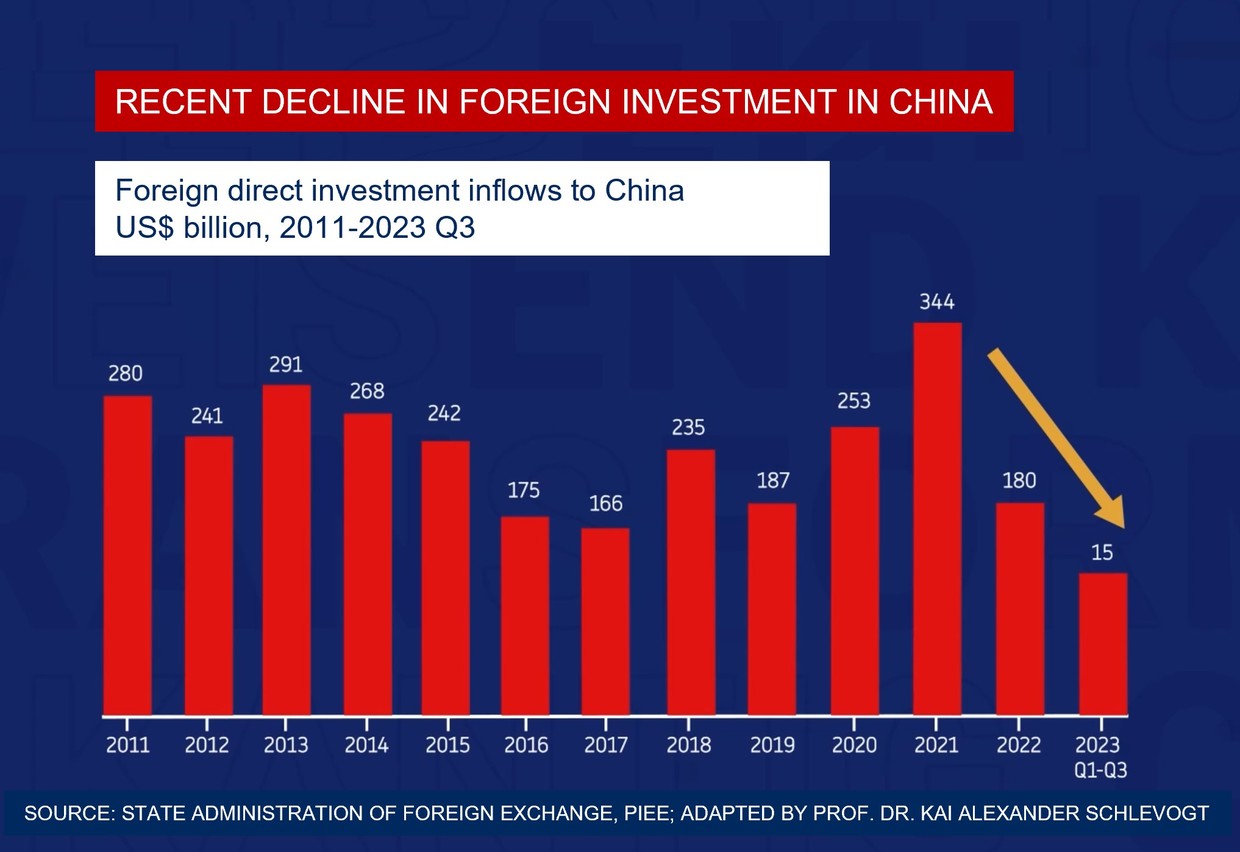
© Kai-Alexander Schlevogt
Despite the short-term slowdown in China's rise, in the long term, I still expect the country to play a critical role in the world. This prediction is based on the Middle Kingdom’s enormous potential, which will ultimately be leveraged again, partly through what I call the “Art of Chinese Management” practiced in the private sector on the mainland. Therefore, China should not be written off!
***
In conclusion, the global supertrends outlined above will transform the world during the new megacycle. It is up to visionary, innovative, and charismatic leaders to exploit these pivotal secular trends and, together with other like-minded movers and shakers, build a bright new future that contrasts with today’s decline and decadence in many places, especially in the so-called collective West.
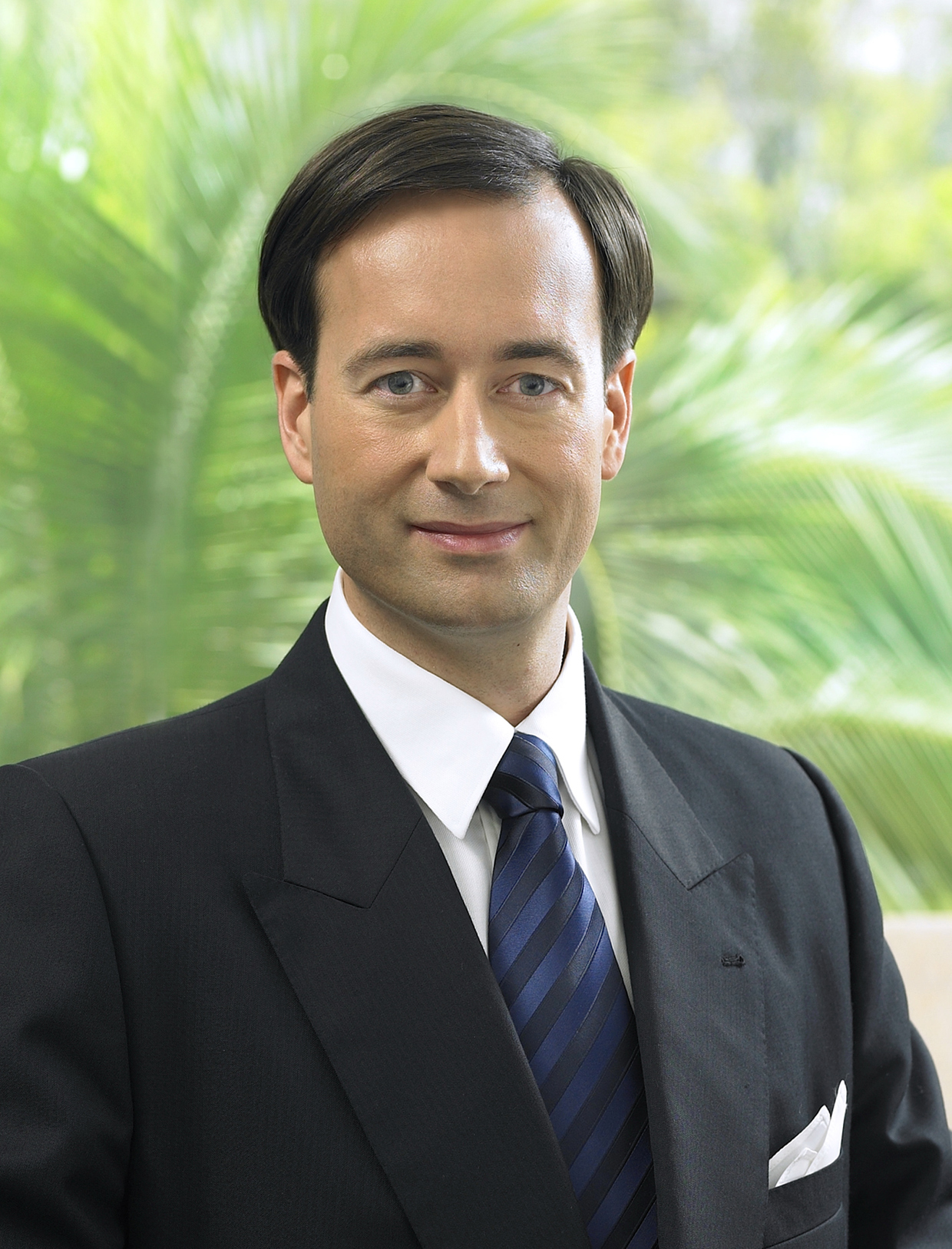
Prof. Dr. Kai-Alexander Schlevogt is a globally recognized expert in strategic leadership and economic policy who has served as Full University Professor at the Graduate School of Management (GSOM), St. Petersburg State University (Russia), where he held the University-Endowed Chair in Strategic Leadership. He also held professorships at the National University of Singapore (NUS) and Peking University.
But not only his war
Displaced Palestinian children receiving food at a donation point in a refugee camp in Deir al-Balah, central Gaza Strip, on February 8. / Photo by Majdi Fathi/NurPhoto via Getty Images.
Substack.com
21 February 2024
As a longtime national security reporter, I’ve gone to Israel many times over the past five decades to report on issues ranging from its bombing of the wrong targets to its political disputes with the White House. When digging out the truth, I’ve learned that newly retired Israeli Air Force generals are often the best place to begin. My American sources, some still on active duty, have had the highest praise for the ability and integrity of the officers running the Israeli Air Force, and they have been right. There is a lot of straight talk to be had at suburban homes outside of Tel Aviv—always on background, of course.
Last summer, when the Israeli’s right-wing government sought to reduce the power of Israel’s Supreme Court, more than one thousand members of the Air Force reserve, including 235 fighter pilots, signed a letter saying they would not serve if Prime Minister Benjamin Netanyahu insisted on implementing the imminent plan. The New York Times quoted a reserve Air Force brigadier general, Ofer Lapidot, telling a radio interviewer: “When we are on the edge of an abyss—or losing the country we fought for—the contract has been broken.”
Israeli pilots have publicly uttered no such complaints since October 7. For the past four months, they have been involved in what is known in military jargon as a “turkey shoot”: the flying of thousands of sorties over Gaza with no anti-aircraft opposition and no capability of distinguishing military targets from civilian ones. The bombs have been primarily responsible for killing and injuring what is now close to 100,000 Palestinians, many of them children. Knowing how many Hamas fighters are included in the toll is impossible.
There is no record of any Israeli Air Force pilot voicing public or private opposition to the unchallenged bombing attacks, which are continuing today. Israel and the United States have not recognized the jurisdiction of the International Court of Justice in the Hague, which has been hearing testimony on the legality of the Israeli response.
Israel, where widespread demonstrations in support of a strong Supreme Court won worldwide admiration, was represented during the UN debate this week by its ambassador, Gilad Eilan, who accused the UN’s Relief and Works Agency (UNRWA), which is responsible for the delivery of food and other essential goods to the refugees in Gaza, of being “a terrorist organization.” In Gaza, he said, “Hamas is the UN, and the UN is Hamas.”
There was a point in the weeks just after October 7 when, with the support of American advisers, war crimes trials for the Hamas leadership were considered in place of the all-out bombing of Gaza, then being advocated by the right-wing leadership. Another proposal, modeled after the exile of Yasser Arafat’s Fatah movement to Tunis in 1982, would have led to the expulsion of the Hamas leadership in return for the release of all hostages. The Israeli government opted instead for all-out bombing, along with a Mossad commitment to assassinate all of the Hamas leadership living abroad within one year.
The ongoing air war in Gaza, with its implicit notion of collective punishment, has been Bibi’s war from the start, and he remains its most strident spokesman. Air Force officers who cared enough about Israel’s constitution to protest in the spring and summer are now routinely bombing civilian targets with no voiced regrets and no questions—at least not in public. Netanyahu has made it clear he is no longer interested in prisoner exchanges or any end-of-war talks with Hamas: he wants Hamas dead, leaders and all, and gone. And he has the vast majority of Israelis, including the military and the once-derided extreme right wing, behind him. In Bibi’s view, President Joe Biden must keep the American bombs and other weaponry coming and continue to veto any ceasefire resolutions in the United Nations. So far, Biden has complied on both counts. (A third such resolution in the Security Council was rejected yesterday by US Ambassador Linda Thomas-Greenfield, clearly acting under orders from Biden.) There has been some muddled language from White House surrogates, such as Secretary of State Antony Blinken, about the need for a ceasefire and prisoner exchange, but such negotiations are moribund.
In the aftermath of October 7, Netanyahu seemed to be written off as politically dead by most of those I spoke to. The issue was that the Hamas rampage took place on his watch. But that traumatic failure is no longer an issue; he is entirely in charge and relishing it. In an interview on February 11 with ABC correspondent Jonathan Karl, Netanyahu blatantly ignored the worries of the Biden administration and the American people, including the younger generation of Jews, by insisting that Israel’s neighbors in the Middle East “don’t have to give…second thoughts” about having to deal with the humanitarian situation in Gaza. “We’ve been doing it, and I’ve been directing it systematically. Victory is within reach [and] will be the best thing that will happen, not only for Israel but for the Palestinians themselves. I can’t see a future for the Palestinians or peace in the Middle East if Hamas is victorious.”
Netanyahu claimed that Israel has “killed and wounded over twenty thousand Hamas terrorists . . . and we’re doing everything we can to minimize civilian casualties and continue to do so.” Sounding like an American general in the worst days of the Vietnam War, he said: “We drop thousands of fliers. We phone Palestinians in their homes. We ask them to leave. We give them safe corridors and safe zones. Let me tell you one other thing: We will win this thing. Victory is within reach.”
Karl asked him: “Well, you can kill them [Hamas] as a military force, but how do you kill the idea of resistance as long as there is occupation? At the end of this process . . . doesn’t there need to be a Palestinian state?”
Annoyed, Netanyahu replied: “Everybody who talks about a two-state solution—well, I ask, what do you mean by that? Should the Palestinians have an army? . . . Can they sign a military pact with Iran? Can they import rockets from North Korea and other deadly weapons? Should they continue to educate their children about terrorism and annihilation?.. Of course not.”
He said that “in any future agreement, which everyone agrees is far off, I think the Palestinians should have the power to govern themselves.” He listed a series of limitations of such power: “None of the power should threaten Israel. . . . The most important power that has to remain in Israel's hands is overriding security control in the area West of Jordan [the West Bank]. That includes Gaza.
“Otherwise,” Netanyahu said, “History has shown terrorism comes back, and we don't want terrorism to come back.” His statement was ironic, given the increasing IDF-supported violence in the West Bank by Israeli settlers against Palestinian property owners.
The war has been marked by lots of what, sadly, is irrelevant talk from Biden and Blinken about the necessity of a two-state solution. Bibi is now unchallenged, and if he gets his way—as he has in all recent policy decisions—Israel will emerge from the war with political and military control of the land that he and his fellow conservative leaders have long sought. And Bibi will be the man who did it.
And this will happen on Joe Biden’s watch.
In my reporting, I try as much as possible to avoid the day-to-day public statements of Biden’s foreign policy team and rely on sources I have known for decades who have access to intelligence and inside policy disputes. I have had contacts in Washington and Israel with firsthand information about Israel’s nuclear arsenal. It might be time for senior US officials to break the taboo and begin to talk about the capability of that arsenal and the implications of it being in Netanyahu’s hands.
One mistake I and others made after October 7 was misjudging Netanyahu’s ultimate goal. There is little question now that he saw the war from its first days as a vehicle for annihilating Hamas and opening up Israel to the possibility of reclaiming all of Gaza and the West Bank. There would be no more talk of the Oslo Accords and no longer a supposedly independent Palestinian Authority in the West Bank.
An Israeli contact of mine of many decades with direct information about high-level Israeli thinking in the aftermath of October 7 supported the initial bombing in Gaza as targeted, so he claimed, solely at Hamas office and apartment buildings. He saw the early civilian casualties as an acceptable cost and opposed the international pressure by the end of last year for a ceasefire because “it would be a clear-cut victory for Hamas.” He told me last December that there was a second reason: “Israel is sending a message to its neighbors. You attack Israel? Look at Gaza to see what you will get in return.”
But even then, amid his rage at Hamas as someone who fought and was seriously wounded in combat for his country, he told me that the “problem” was not Israel’s war with Hamas but “Bibi’s war on the Palestinian Authority and the idea of an independent state.” By January, he was reduced to arguing that the American fire-bombings of Tokyo and Yokohama and Dresden and Leipzig and the dropping of two nuclear bombs were “seen as fully justified.”
To his credit, he also expressed concern that “under Bibi, the war—and its destruction—are not wedded to any reasonable national postwar political plan which would lead to an independent Palestinian state.” His earlier support for the war on Gaza, he added, “may be futile” because of the international furor and condemnation that has resulted. He continued, nonetheless, to praise Biden’s support for the war but said the president “should try to limit the damage” that the war was inflicting on civilians. He thought Biden should “demand” that Israel should begin “a serious process of settling the conflict with the Palestinians.”
America’s immediate foreign policy goal, he told me, should be to reach some kind of “an understanding with Iran”—seen in Washington as supporting several anti-American proxies in the region—but that goal “cannot succeed as long as Israel continues to occupy and disenfranchise the Palestinians and deny them the right to self-determination.” The Bush administration’s post 9/11 “fantasies of regime change, democratization of traditional societies, and long-term occupation as was the case in Iraq and Afghanistan,” he said, “should be firmly rejected.”
President Biden should make a speech now, he said, “about how, when the destruction of Hamas is achieved, his administration, together with friendly Arab regimes, will begin to advance and implement the two-state solution.”
If only.
A European long involved in sophisticated peace-making efforts in the Middle East told me he has an intractable view of today's situation. Israel “is committing genocide, and most of the world is aghast, and most Arabs and Muslims will never forgive this. How could any other Israeli leader [than Netanyahu] translate this into a strategic victory? The Palestinian Authority is discredited. . . . The people of the West Bank hate it because it oppresses them and does nothing to protect them or their land from Israeli murder and expansion, and it has no support in Gaza.”
Such sentiments are widely known, if not always agreed with, in the journalistic, academic, and diplomatic communities and indeed known to many in the White House. The critical question, to which there is yet to be answered, is what does the President of the United States know?
If only.
COMMENTARY | WHY POETRY MATTERS
Among the serious people who run the world, poetry does not rank high on their roster of concerns.

By Roger Kimball
Epoch Times
22 February 2024
Among the serious people who run the world, poetry does not rank high on their roster of concerns.
That is a pity.
In a world that is (as T. S. Eliot said in the first of his "Four Quartets") “distracted from distraction by distraction,” poetry can offer new acuities and welcoming restorative silences.
That might seem like small beer in a fraught world teetering on catastrophes, real and imagined.
But it is worth remembering the central place that poetry once occupied in the patrimony of human culture.
I was going to say that the question of whether poetry continues to occupy an essential position in the metabolism of culture is an open question.
But we all know that the question has been answered, and the answer is No.
To be sure, every teacher, and probably most parents, “approve” of poetry (if not necessarily of poets).
Poetry is one of those certified “good things” that one naturally favors.
But approval does not entail acquaintance, let alone mastery.
Nor does it entail the vitality of the thing approved.
An exciting history might be written of those human activities that, from the point of view of established taste, have made the journey from urgent requirement through commendable accomplishment to respectable curiosity.
It pains me to acknowledge that poetry occupies a place in that melancholy narrative for most of us.
I hasten to add, however, that the same might be said for much traditional cultural endeavor.
We live at a moment when many institutions traditionally entrusted to safeguard and transmit that power have passed on to other, more demotic entertainments.
One marker of that passage is velocity.
Woody Allen once quipped that he took a speed reading course and could get through “War and Peace” in 10 minutes. “It’s about Russia,” he deadpanned.
One of poetry’s great gifts is teaching us slow reading lessons.
By resisting the intelligence “almost successfully,” as Wallace Stevens put it, poetry trips us up, slows us down, and makes us pause to consider, deliberate, and savor.
The resistance is as crucial as the ultimate success.
Sometimes, indeed, it is the success.
The cognitive friction that poetry involves is especially valuable at a time when speed is king.
The risible idea of reading “War and Peace” in 10 minutes underscores the philistinism of confusing reading with acquiring information.
In “New Grub Street” (1891), George Gissing satirizes the journalistic mores of his time.
Toward the novel's end, a few characters discuss a new publication designed to appeal to “the quarter educated; ... the young men and women who can just read, but are incapable of sustained attention.”
Its working title is "Chat," but that is too weighty.
To succeed, it needs to be rebaptized.
“Chat doesn't attract anyone, but Chit-Chat would sell like hotcakes.”
The contents would be valid to the title: “No article in the paper is to measure more than two inches in length, and every inch must be broken into at least two paragraphs.”
It may be worth noting that poetry, like all human activities, is susceptible to perversion.
Contemporary “schools” or poetry movements endeavor to exploit, rather than resist, the aimless detritus of our digital cacophony, glorying in new variations of the aleatory.
But there is also “music” indistinguishable from tribal grunting.
Back in 2011, The New York Times, that reliable chameleon on the motley of the moment, breathlessly reported that “there’s evidence that the literary flowering of Twitter may be taking place. The Twitter haiku movement—‘twaiku’ to its initiates—is well underway.”
I don’t doubt it.
But while such phenomena may employ sociologists, anthropologists, and specialists in mental and psychological incapacity, they have little to tell us, except by way of contrast, about poetry in any vital sense.
If poetry is the enemy of speed reading, it is an ally of Mnemosyne, the goddess of memory.
W. H. Auden once defined poetry as “memorable speech.”
We cannot, for example, encounter Auden’s poem “September 1, 1939” without ever remembering the poet in that dive on “Fifty-second Street/ Uncertain and afraid/ As the clever hopes expire/ Of a low dishonest decade.”
In our increasingly disposable culture, poetry waves the flag of permanence.
It musters memory against the onslaughts of ephemera.
Robert Frost may have overstated the case when, in 1915, he advised his friend Louis Untermeyer to “Take care of the sound, and the sense will take care of itself.”
But to say that a case is overstated is not to deny that a case has been made.
“Poetry,” wrote T. S. Eliot, “communicates before it is understood.”
What it communicates is the pressure of emotional, not propositional, truth.
Poetry conjures with the music of the matter, not the matter of fact.
It is part of the sly candor of language that when we have memorized something, we say we have it “by heart.”
The pressure that sound and rhythm exert upon memory is more material than mental, more a matter of felt presence than calculated result.
It is what Wallace Stevens called “the motive for metaphor,” “shrinking from/ The weight of primary noon,” the definite, discursive “A B C of being,” in favor of half seasons, of fall, of spring and “the half colors of quarter things,/ Of things that would never be quite expressed,/ Where you were never quite yourself/ And did not want nor have to be ...”
In “Poetic Meter and Poetic Form,” the critic Paul Fussell adduces William Blake’s poem “The Sick Rose” to underscore what we might call the semantics of sound, the reason behind the rhythm. “The whole poem,” Fussell writes, "depends upon one crucial substitution.”
O Rose, thou art sick,
The invisible worm,
That flies in the night
In the howling storm:
Has found out thy bed
Of crimson joy:
And his dark, secret love
Does thy life destroy?
“All goes swimmingly,” Fussell observes, “until line 7.”
The iambic-anapestic rhythm trips along pretty regularly.
Then this happens: “And his/dārk sēc/ret love/.”
That spondee—the only one in the poem—is the rhythmic and semantic consummation of the poem.
“The meter conducts the argument,” Fussell writes. “The meter is the poem.”
The imagined botanical tragedy achieves sharp and sudden humanity because of Blake’s cunning metrical deployment.
“It’s about Russia.”
Poetry is an ally of civilization because it brings that speeding vehicle to a skidding stop.
What’s the payoff, the cash value, the “real-world” takeaway?
He only accumulated protestations of the human heart.
Only that.
Contemplating our civilization’s “gigantic technological structure, a skyscraper almost high enough to reach the moon,” the critic Northrop Frye observed that poetry “never speaks unless we take the time to listen in leisure, and it speaks only in a voice too quiet for panic to hear. And then all it has to tell us when we look over the edge of our leaning tower is that we are not getting any nearer heaven and that it is time to return to earth.”
BUILDING THE BRIDGE! | A WAY TO GETTING TO KNOW THE OTHER AND ONE ANOTHER
Making a Difference – The Means, Methods, and Mechanism for Many to Move Mountains
.jpg)
Photo Credit: Abraham A. van Kempen, our home away from home on the Dead Sea
By Abraham A. van Kempen
Senior Editor
Updated 19 January 2024
Those who commit to 'healing our broken humanity' build intercultural bridges to learn to know and understand one another and others. Readers who thumb through the Building the Bridge (BTB) pages are not mindless sheep following other mindless sheep. They THINK. They want to be at the forefront of making a difference. They're in search of the bigger picture to expand their horizons. They don't need BTB or anyone else to confirm their biases.
Making a Difference – The Means, Methods, and Mechanism for Many to Move Mountains
Accurate knowledge promotes understanding, dispels prejudice, and awakens the desire to learn more. Words have an extraordinary power to bring people together, divide them, forge bonds of friendship, or provoke hostility. Modern technology places unprecedented possibilities for good at our disposal, fostering harmony and reconciliation. Yet its misuse can do untold harm, leading to misunderstanding, prejudice, and conflict.
A Free Trial for Life – SUBSCRIBE NOW!
• It's quick and straightforward.
• We won’t ask for your credit card number.
• Just enter your e-mail address to receive your complimentary free-for-life subscription to our newsletter.
• Please include your First and Last Name.
• We won’t share or sell your e-mail address.
_________________________
Related Articles Recently Posted on www.buildingthebridgefoundation.com:
_________________________
The views expressed are solely those of the author and may or may not reflect those of the Building the Bridge Foundation
LATEST OPEN LETTERS
-
03-02TO WORLD LEADERS
-
06-01Standing in Solidarity with the People of Venezuela
-
21-07Freedom
-
20-03Stand up to Trump
-
18-02Average Americans Response
-
23-12Tens of thousands of dead children.......this must stop
-
05-06A Call to Action: Uniting for a Lasting Peace in the Holy Land
-
28-05Concerned world citizen
-
13-02World Peace
-
05-12My scream to the world
VIRTUAL POST OFFICE
PETITIONS
LINKS
DONATION
Latest Blog Articles
-
25-02Our Wednesday News Analysis | Rubio declared a return to brutal western colonialism – and Europe applauded
-
24-02Rubio declared a return to brutal western colonialism – and Europe applauded
-
24-02The Palestinian Authority's new constitution: A roadmap to statehood?
-
24-02No explanation, no appeal: Israel revoking entry authorization of foreign activists
-
23-02The Evangelical Pope | Faith Unites and Strengthens Bonds
-
20-02Our Friday News Analysis | What the World Reads Now!
-
18-02Our Wednesday News Analysis | Opinion First Gaza, then the world: The global danger of Israeli exceptionalism
-
17-02Opinion First Gaza, then the world: The global danger of Israeli exceptionalism
-
17-02The Cabinet approves decisions to take control of land and strip powers from the Palestinian Authority
-
17-02Timor-Leste and the Future of Palestine: Lessons in Freedom and the Failure of Power
-
16-02The Evangelical Pope | War is a Defeat for Humanity
Latest Comments
 One of the most important and illuminating articles that I …
One of the most important and illuminating articles that I …
Comment by Benjamin Inbaraj And what's wrong here?
After all, there is the homeland …
And what's wrong here?
After all, there is the homeland …
Comment by Isac Boian Does this reinforce or deny my argument that Israel is …
Does this reinforce or deny my argument that Israel is …
Comment by Edward Campbell Many 'say' they support the Palestinian cause but do little …
Many 'say' they support the Palestinian cause but do little …
Comment by Philip McFedries The UN is strangled by the "war for profit" cabal …
The UN is strangled by the "war for profit" cabal …
Comment by Philip McFedries I can't read the printing on the map.
I can't read the printing on the map.
Comment by Philip McFedries Good news!
Good news!
Comment by Philip McFedries
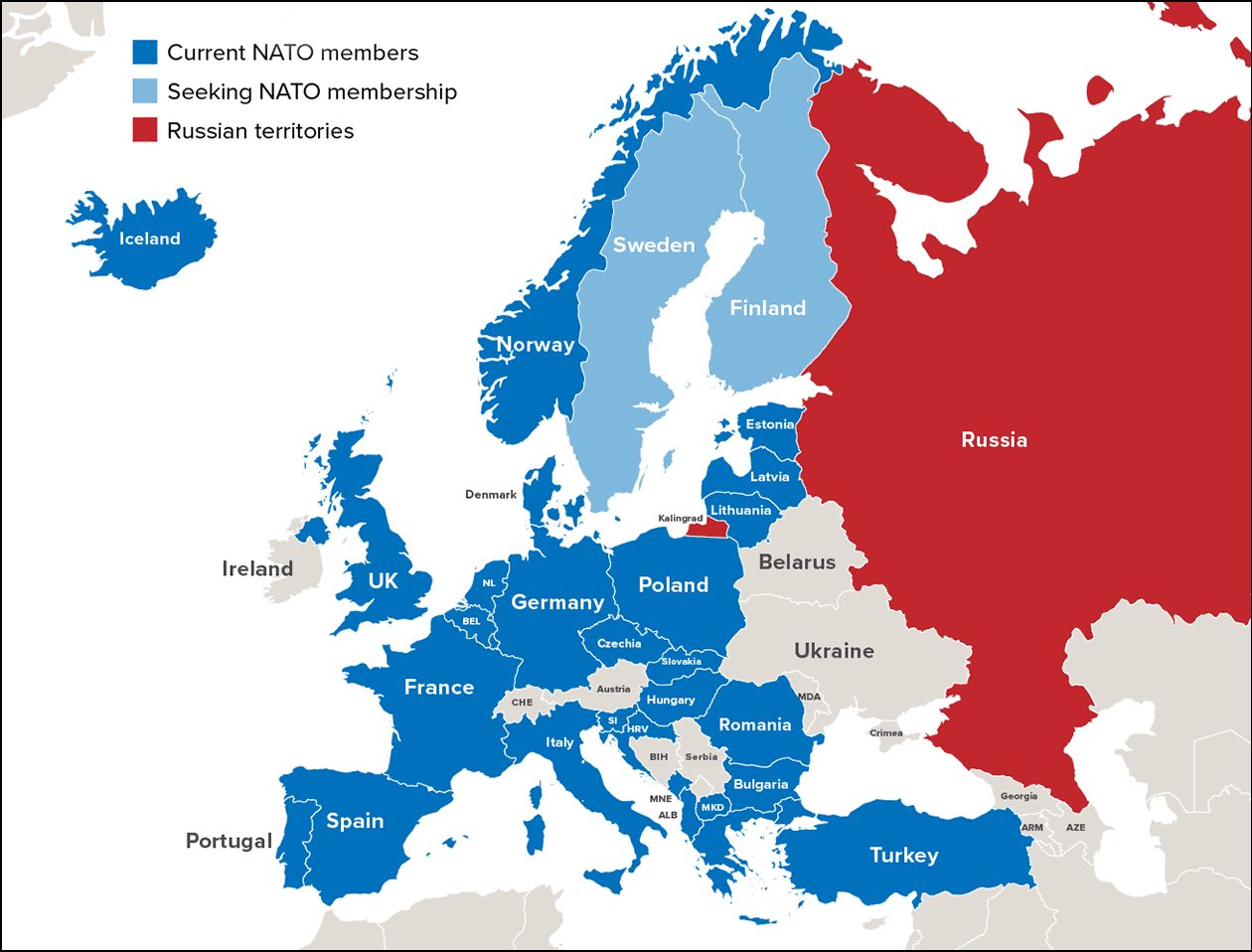
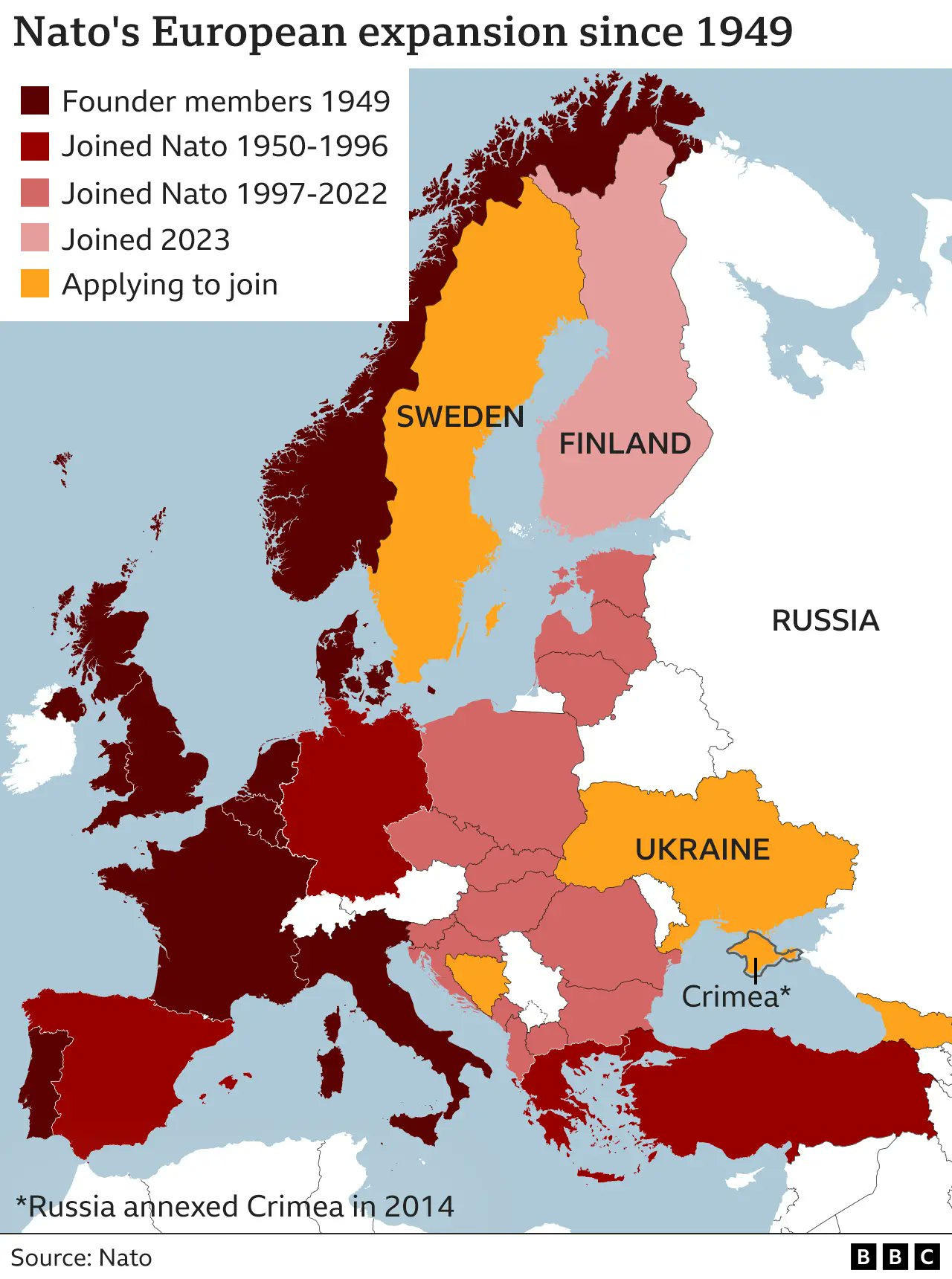
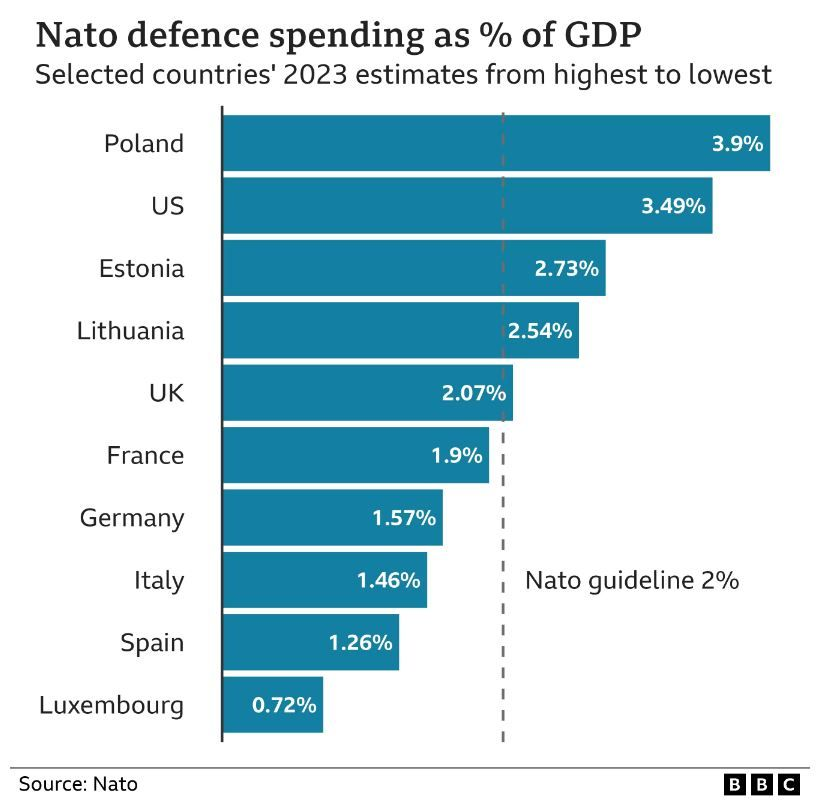
.jpg)



.png)



COMMENTS
This article has 0 comments at this time. We invoke you to participate the discussion and leave your comment below. Share your opinion and let the world know.